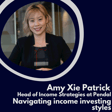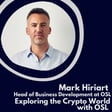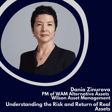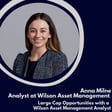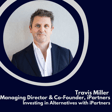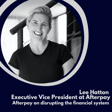Introduction and Announcements
00:00:02
Speaker
We're excited to partner with Women in Banking and Finance, also known as WIBF, for 2022. WIBF is a not-for-profit membership association aimed at increasing the representation of female leaders in the banking and finance sector. WIBF provides courses, events and mentoring for females in finance. To find out more and become a member, visit www.wibf.org.au.
00:00:32
Speaker
Welcome back to the Alpha Females Invest podcast. We bring diversified perspectives from the buy and sell side of the finance world. As usual, any information discussed in this podcast is not financial advice. All opinions reflect those of the individuals and this podcast is for educational purposes only. You should always read the PDS and talk to a financial advisor who can consider your personal circumstances before you invest.
00:00:58
Speaker
If you like listening to Alpha Females Invest, we would love your support on Instagram at alphafemalesinvest, and you can also find us on LinkedIn. And if you do want to find out more information about us and our episodes, you can visit our website at alphafemalesinvest.com.au, and please note that episodes may be supported by guests from time to time.
Sarah Rennie's Background
00:01:18
Speaker
Today, I'm very excited that we have Sarah Rennie, who is co-head of investment banking and head of equity capital markets Australia at Jardim. Sarah started her career in investment banking at UBS, where she gained experience across Australia and New York. And more recently, she was head of equity capital markets at Goldman Sachs Australia.
00:01:40
Speaker
She has a 20-year career and experience across the full spectrum of large and complex equity capital markets transactions, and is also a member of the Australian Takeovers Panel. We're so excited to have a very amazing female on our show today, so welcome, Sarah. Thank you very much. It's great to be here.
00:01:59
Speaker
So we kick off our episodes with the same question every time.
Lessons from the Field
00:02:04
Speaker
And we think it's one that really makes, I guess, a little bit more relatable to our audience. So could you please share an embarrassing career story that might have happened throughout your very long and established career? Yeah. And I've been thinking about this. I mean, there's obviously a huge database of errors and hiccups in a 20 year career. And I can't remember the specifics of a lot of them, which is probably instructive in itself.
00:02:29
Speaker
One of the major hiccups that we had as a team, it wasn't me that actually pressed the button, but we all accepted responsibility for it was we were getting ready for a big deal launch. It was highly confidential. We were set to launch in about 48 hours and one of the team members was getting all the documents ready to email out and she accidentally hit send on it 48 hours before, before the time. And so.
00:02:54
Speaker
We went into absolute crisis mode. The stock needed to go into halt. We needed to explain to the corporate why we'd push them off the ledge before they were ready. And it was hugely stressful at the time. I think now looking back, we can sort of laugh at a little bit in terms of how we responded to it. But it was a very stressful moment at the time and something that scares the hell out of you when it occurs. But, you know, it's important to protect the whole team when those sorts of things happen.
00:03:23
Speaker
For me personally, what I remember now are deals that don't perform well once we sell them and really atrocious performances. I did an IPO, I think in 2007 that was delisted by January 2008. And at the time it felt like the world was ending. It was actually a canary in the mind for the GFC, but we couldn't see the big picture at that point, but it's incredibly stressful when things like that don't go the way you expect.
00:03:52
Speaker
They are very stressful career moments, especially when you have to stop a stock from trading. That has some pretty big implications, so it makes me feel a little bit better about some of my personal embarrassing stories.
Investment Banking Insights
00:04:07
Speaker
Sarah, to start it off, can you just tell us how investment banking fits into the overall financial system and where do you see it going?
00:04:16
Speaker
Sure. Well, it's not overly complicated in terms of the concept of it. Investment banks provide strategic advice and they provide access to capital primarily to corporations, governments, private equity, and the types of transactions that we typically do are mergers, acquisitions, initial public offerings, follow on raisings, block trades, and we don't typically touch the retail investor unless it's part of a
00:04:46
Speaker
a capital raising opportunity like an IPO. Yeah, that makes sense. And then following on from that, how would that fit into the functions of an investment bank? Because obviously an investment bank like Jarden is broader than just the investment banking division. Yeah, that's right. So I kind of think of it a bit like we have different verticals and on the private side is the investment banking side. And then on the public side, we have the securities business, which is equities and debt capital markets.
00:05:14
Speaker
We have the research function and for Jardim, we also have wealth management and principal investing. Not all investment banks have all of those limbs, but for Jardim, we do. Now, when you think about the way we all interact, there's a sort of a Chinese wall or an information barrier between what the investment banking group does and the rest of the bank. And so information really only flows one way across that wall with information can't flow from the investment banking side to those
00:05:44
Speaker
other divisions. Sarah, you just touched on it before, but when I asked you a broad-based question, you mentioned the concept of equity raisings, IPOs, and blocks. And I think that when most people think about investment banking transactions, they think about them as being single-sided. So can you please expand on each of those transactions that you touched on and the key differences between them? Sure.
00:06:10
Speaker
So I think people think about maybe those types of transactions, the capital raising transactions is single sided because a lot of focus goes on to the corporate issuer where we're raising capital for a corporation. And at the start of a transaction, it is quite heavily weighted to the corporate issuer side of the transaction, but there's actually a balance. And on the other side of that transaction, the institutional and retail investors who are also very important clients of ours. And so.
00:06:40
Speaker
And as we move towards the execution or the sales part of those transactions, it's really the institutional clients that become the most important players to some extent because the transaction will live or die in terms of their appetite for the transaction. You know, ultimately we're looking for like a Goldilocks sort of outcome where, you know, it's very well received, but not so well received that the corporate thinks that we've sold it too cheaply. And also.
00:07:06
Speaker
the stock doesn't trade down below the price that we sell it so that the institutional investors feel like we sold it at the wrong price. And so there is that balancing act between two very important types of client that we're trying to navigate through as we execute an equity capital markets trade. And just touching on the different types of transaction, the initial public offering is the first one that a company will do as it lists onto the ASX. And then we have what we call follow on transactions, which are rights issues or placements, which
00:07:36
Speaker
which they use once listed to fund acquisitions or shore up their balance sheet. And the final type of transaction is really a block trade and that's a sale by a big shareholder who wants to move more than they could ordinarily just by trading in the screen on the market. They want help to move a very large line and will underwrite a transaction like that and sell it to a broad selection of institutional investors.
00:08:01
Speaker
Yeah, it's interesting how you have to kind of balance both of your clients, you know, the corporate and then the institutional investor such as us. And I can imagine you do want the win-win outcome for both. That would be a very tricky process to manage. So we've obviously got ECM and DCM, so equity capital markets, debt capital markets. And typically a company at one stage will only use one or the other, or do they use both? And how do you determine how money should be raised through different structures?
Capital Raising Strategies
00:08:30
Speaker
Yeah, so I think each company is different and we make an assessment of what's the optimal capital structure for each corporate and it really depends on the nature of their operations, how cyclical or volatile they are and what stage of development the company is at. Is it very early stage or is it quite a mature business which is a lot more predictable and therefore can take more debt onto their balance sheet? So the way we think about it typically is what's the right level of debt for a company?
00:08:59
Speaker
And you'll look at metrics like a ratio of EBITDA, or you might look at a credit rating or an interest coverage metric. And then once you've established the right level of debt, then you will use the equity as a plug or as a backstop for what else is required. We will often undertake an equity raising and a debt raising at the same time if we're looking to make a very large acquisition. But in other situations, it could just be an equity raising on its own
00:09:28
Speaker
if the debt is at a reasonable position or you're looking to take down debt via an equity raise. And Sarah, I feel like most people only think about equity capital raisings as an option. If I'm taking a step back out of the finance world, do you think that the debt franchise is becoming larger or more common as clients become less risk adverse to different types of debt structures?
00:09:51
Speaker
I feel like maybe historically debt structures have typically been a little bit more vanilla, and now corporates are starting to explore different debt structures a little bit further and becoming more complex in the way we can structure them. Yeah, absolutely. I think over the last few years, and maybe it's just been a function of having very low rates and people chasing greater yield, but definitely the debt capital providers, the universe has expanded materially.
00:10:19
Speaker
the types of structured debt products has also expanded. And I think as you think about the universe, it's very difficult to compete with the big four banks in terms of quite vanilla lending products because they have a very low cost of capital. And so you
Market Conditions and Private Equity
00:10:34
Speaker
can't get the level of return that you need if you're competing with the big four bank, they'll always win that shootout. But as you move up the risk curve and you move to higher risk products with greater return opportunities, then I think that universe
00:10:48
Speaker
has expanded, we've seen private equity, we've seen hedge funds all enter into that space. What's going to be interesting though is we're heading into quite a different type of market. There's a risk of a recession people are talking about and I think the risk dials are ramping up at the moment and it's going to be very interesting to see
00:11:07
Speaker
The portfolios that some of those alternative debt providers have on their books right now, whether they are going to stand the test of time through this more volatile period and whether or not they withdraw from the market or they're looking to seize the opportunity to really look for people who are hungry for capital as the situation evolves.
00:11:27
Speaker
Yeah, it's interesting. And thank you for getting through all that kind of technical background details. So hopefully we've kind of locked that in everyone's minds. But I would actually like to go into a little bit more specifically on your experience and maybe the differences that you've found working for a global bank like Goldman's versus Jarden, which is obviously primarily across Australia, New Zealand. And if, you know, there are significant career differences in those types of organizations. Yeah, well, I mean,
00:11:56
Speaker
The transactions and the clients are exactly the same and so day to day your job is not really different whether your head office is in Australia or New York. There's definitely a lot less late night conference calls and I would say that it's great to have local decision making and a focus on local objectives rather than needing to necessarily fit within
00:12:19
Speaker
the objectives of the global firm, which not necessarily going to be completely aligned with the objectives of Australia and New Zealand. And I have found with Jarden, there's a real nimbleness and ability to make decisions really quickly, probably because it impacts two jurisdictions rather than 30. But those decisions allow us to really seize on opportunities as we find them. Whereas sometimes I think we would have missed an opportunity just because
00:12:48
Speaker
the machine needs a little bit of time to think when you're really dealing in a very large global organization. That's really interesting. And I guess the key difference there being that localization aspect. And also in this type of environment, I think it's really interesting given the current markets that we're in and after a huge period of transactional activity. So I guess we're interested to hear what's your perspective on what is happening in markets globally, but also back here more locally focusing in on Australia.
00:13:18
Speaker
I think the situation is probably going to be quite similar globally and in Australia. We're coming off the back of record level M&A activity over the last couple of years and I don't believe that is going to be replicated this year and into the next couple of years just because we're moving into a different time and particularly because of the rates outlook and the cost of funding is going up.
00:13:44
Speaker
deals are necessarily going to be harder to make work from a financial perspective. It's fair to say though that I still think M&A is going to be reasonably active. And part of that reason for that is a number of stocks are screening very cheaply at the moment. If you think about the tech sector, it's down 30 to 40%, maybe 50% for some of the stocks which are not cashflow positive and who've really been hit hard in the current
00:14:11
Speaker
correction and so this is a time where some of the larger more well capitalized companies or private equity funds are thinking I might take advantage of this depressed valuation and seize on an opportunity that I've been watching for a long time and we're starting to see some evidence of that. I think private equity firms generally are very well cashed up. They've all raised capital, quite significant leaks of capital in the last couple of years and that money is yet to be put to work so
00:14:40
Speaker
there's still going to be reasonable deal flow coming out from those institutions as they look to invest the money that they've raised. So it's going to be active, but not in the crazy active that we've seen over the last couple of years is my expectation.
00:14:54
Speaker
Yeah, I think that's definitely what I've noticed as well, just particularly in equity capital markets. And that actually flows quite nicely into our next question, which is the process of actually going out there and finding deals, because I assume sometimes the deals come to you given your reputation and they maybe have got an idea that they want to do something in their head, but I also
00:15:16
Speaker
Suspect that there's a process of going out there and pitching for deals and providing Suggestions to what types of structures companies may want to do with their balance sheet or maybe it is going out to private equity and Trying to see what deals may be good value or make sense for the current markets so I guess my question is how often is it inbound and is it a process of going out there and building relationships and
Deal Generation and Opportunities
00:15:42
Speaker
I would say it's all of the above. There are clients that we have who consider us their trusted advisor or house advisor, and they will show us nearly everything that they're thinking about. But there are a lot of times where we generate a transactional mandate by building relationships, keeping your ear to the ground, staying connected, hearing something and putting two and two together and being opportunistic. And you definitely cannot wait for the phone to ring because it's a highly competitive market.
00:16:12
Speaker
We spend a lot of time trying to think up and pitch ideas to corporates, even once we were not the house advisor and really trying to differentiate ourselves on idea generation and thinking of a better mousetrap or a smarter way of doing something.
00:16:29
Speaker
And that's a culture that we're trying to really develop at Jardin and not just from the top down. I think, you know, we're strong beliefs of the fact that the idea can come from anywhere and we're really trying to create flat structures where those ideas can bubble to the surface because ultimately that's what clients really value, not just a relationship, but somebody who's going to give them an edge in terms of access to capital or access to assets.
00:16:56
Speaker
That's great. And especially, I like that you mentioned ideas can come from anywhere. That's a really open mind concept. And flowing on from that, what do you think are the key opportunities in this market, particularly given that we're seeing a really volatile equity market at the moment? Well, you know, from an equity capital markets perspective, volatility uncertainty, generally my friend, and I think back to the global financial crisis and
00:17:24
Speaker
also to the latest issues we had as we considered COVID back in 2020. And they were probably the most active capital raising times of my career. And so I look upon these situations as potentially risky, but also potentially a significant opportunity. At the moment, deal flow has slowed. And I believe that's partly because we're at a bit of a crossroads and we don't know which way this is going to evolve.
00:17:52
Speaker
it's either going to get a lot worse, in which case it'll be more capital raisings around balance sheet repair and making sure that cash flow and retained earnings are in a situation where they can weather all types of storm, or things could get a lot better from here and people could start feeling more positive about the outlook. And to that extent, you know, then I think acquisitions and M&A and more risk on types of transactions will come back into the fore. But at the moment,
00:18:21
Speaker
Nobody's quite sure which direction we're heading. And so I think once we get some certainty either way, then deals will resume. Yeah. And you did touch on it a little bit earlier and kind of, I guess the dichotomies between private markets and potentially the listed corporates. Are you, you know, obviously the private equity and maybe thinking that this could be a good opportunity to utilize some capital. Is that in contrast to corporates who are maybe a little bit more cautious given the current markets?
00:18:48
Speaker
Potentially, I think corporates and listed corporates in particular are always probably a bit more risk averse than private equity. And they've got public shareholders and a public market they're answerable to every quarter or every half. And so I think they feel a little bit different about their responsibilities and willingness to take on risk. I think that what we've seen in also in public markets versus private markets is
00:19:15
Speaker
Public markets have seen a more material downturn in valuations versus private markets right now. Now, whether that is a lag or there is genuinely a differentiation between the two is a question that we debate a lot internally. If you look at the tech market, I suspect it's a lag and it's just that we see real time what valuations for technology stocks are and you don't necessarily have that valuation update to the same extent in unlisted corporates.
00:19:44
Speaker
In real estate, I think it's more interesting and we're not quite sure. There seems to have been a differentiation for a very long time between private real estate investments and public, and it'll be interesting to see whether that actually closes, but there's been a real movement in public valuations over the last three or four months.
00:20:02
Speaker
Yep, definitely. And then just turning our attention a little bit back to Jardin and the business that you helped to run, given that you are a relatively newer player into the Australian market, do you think you've been able to capture, share and provide a differentiated service to
Jarden's Operations in Australia
00:20:18
Speaker
your clients? Is that something that you've seen? Well, I mean, we've been operating in Australia for two years, so it's still pretty early. We've been really excited by some of the transactions that we have undertaken. We've done IPOs for Peter Warren and
00:20:32
Speaker
Lynch Group. We've done a demerger for Endeavor out of Woolies. We're acting on defense for Borrell and more recently for Brambles. And so there's been some fantastic transactions, but to say that we are where we hope to be, that would be overstating. And I think we've got very big aspirations for the business. And so there's still a lot of work to be done, but we're excited by the momentum we've got in the business.
00:20:55
Speaker
Sarah, you've clearly had a fantastic career and I've loved hearing about your GFC experience before. But do you have a favorite deal or transaction that you've worked on and can tell us a bit more about why that was your favorite? Sure. I mean, I've worked on a lot of transactions and it's hard to pick a favorite child actually through all of this. You know, as I think about what makes me really enjoy a deal, firstly, it's a really great client.
00:21:22
Speaker
And so there are some IPOs that I've worked on where there's been a founder who's built the business over many years. They've mortgaged the family home and, and really helping someone like that to realize their dream via an IPO. I find that incredibly rewarding. There's also transactions which have been groundbreaking and you feel like you're really proud of something quite differentiated that you know, your peers are looking at it and thinking, wow, how did they do that?
00:21:49
Speaker
which is also quite motivating for us as a team. I worked on the Caltechs block, I think it was 4.6 billion when Chevron sold down their interest in Caltechs. Now for me, that was the biggest block in Australian history. And to sign an underwriting agreement for $4.6 billion, it was scary, but also incredibly exciting. And we were really proud of what we did as a team for that transaction. I think ultimately,
00:22:18
Speaker
Investment banking is a team sport. You can't survive as a sole operator. And so really, when you have those successes and can really be proud of what you've done with the team, that's incredibly rewarding for me.
00:22:32
Speaker
I think that's a really interesting aspect calling it a team sport because I do think there's a bit of a misconception out there that investment banking is very much driven by senior people in the firm and not really a team effort. But turning back to the market, are you finding any challenges in investment banking at the moment?
Challenges in Investment Banking
00:22:50
Speaker
Obviously, inflation is at an all-time high for recent times. Globally, talent is tight. Are you seeing any challenges for your business or for your sector? Sure.
00:23:02
Speaker
You know, the wall for talent has been intense and I think new businesses like Jardin can make that even more intense. And so we accept some responsibility for that, but I feel like that is moderating and probably that's partly just the deal flows moderating as well. You know, as we look ahead right now, I think the biggest issues for investment banking businesses, market volatility and economic outlook and uncertainty and the impact that's going to have on
00:23:30
Speaker
on deal flow either because valuations are lower and corporates have more risk averse when their valuations are lower and they don't want to issue equity at these prices to acquire anything else. And I think it's just probably going to be a bit harder to fund M&A as funding costs increase and the outlook is less predictable. And so whether or not all of the M&A transactions that are being planned actually get to execution, I think is another question.
00:24:00
Speaker
Thanks Sarah and a lot of our listeners are either currently working in finance across a pretty broad range of disciplines or they're studying finance or commerce. I would be interested to understand what you look for when you're appointing an analyst or what are the key banking skills that you think that someone should have to come into your team?
Skills for Analysts and Mentorship
00:24:21
Speaker
Yeah, well I think at the start of a few of these characteristics is helpful.
00:24:27
Speaker
believe that anyone needs to be absolutely perfect at the time that they join and everybody has strengths and weaknesses. But as I think about what helps as you start your investment banking career, I think curiosity, willingness to work hard, willingness to collaborate, strong communication skills.
00:24:46
Speaker
and attention to detail is very important as well. Now, did I have all of those things when I started my investment banking career? Absolutely not. And I think some of those hiccups and embarrassments of my last 20 years have been because I was still learning on the job. But I think you develop it over time and there isn't an expectation that you're perfect on day one, but those are all aspirational targets to build up through your career.
00:25:11
Speaker
It's good to hear we don't have to have every single skill set on paper. I definitely don't and we absolutely learn on the job. But there is a perception that when you start an investment banking specifically, compared to maybe other areas of an investment bank, the first few years are very much focused on modeling or deck creation. At what stage does the role become a little bit more client facing? And does Jordan have any programs to specifically mentor juniors to help them excel in their careers?
00:25:41
Speaker
Sure. Yeah. And I think that's right. I mean, you do spend a lot of time preparing decks and financial models. That's just part of the job. But, you know, it really is important to get exposure and access to meetings and meet clients so that you get a full learning experience. I do believe that investment bankers versus accountants and lawyers probably get access to quite senior people within corporates quite early on in their careers. You're obviously not going to be
00:26:10
Speaker
ready to lead a meeting with an ASX 50 CEO in your first year or two, that takes time to learn that kind of skill and have the depth of understanding of the topics that are going to be covered. But what we try to do as a start is you've prepared some pages, we'll give an analyst or an associate a couple of pages that they know well to present as part of an overall presentation. I think COVID has been helpful in that
00:26:37
Speaker
You know, if you think about going to a meeting and if there's six people on a team, it's quite difficult to turn up physically with six people to a meeting with one person on the other side. But what COVID has allowed us to do is have everybody join a Zoom call and everyone's been able to listen and really get a better understanding of the transaction. You know, in terms of what we do, we get people to practice and get, you know, small bite-sized pieces of presentations at the start. And we also do quite a lot of training around
00:27:06
Speaker
presentation skills and communication skills so that you're ready to go at the time when you really get your opportunity to present in a more fulsome way. We think of investment banking as an apprentice type culture and apprentice type responsibility where you can't learn everything you want or need to learn about investment banking from a textbook. You actually need to listen and hear how people are interacting and how deals evolve.
00:27:33
Speaker
for you to be able to put that into your mental database of how to operate as you get more maturity and more senior as you develop. And so we understand that and we're trying to give as much experience and exposure to our junior team members as we can so that they can continue to learn and develop.
00:27:51
Speaker
It sounds like there's a lot of attention on training up to get the skill sets, which I think is so critical for people on their career journey. And I think what attracts people to certain industries and to investment banking to get that exposure to senior people who have had a really successful career like yourself. So in saying that, we would love to ask our final question, which again is one question that we ask all of our guests, just to share a top career tip that you think may be useful to us because we're always learning and taking on the feedback.
00:28:21
Speaker
and also to our audience.
Facing Challenges Head-On
00:28:23
Speaker
Sure. Well, this is one that was passed on to me, actually, but I really liked it. And it was a colleague or a senior colleague of mine who said you should always run to the problem. And, you know, as things always go wrong on transactions or in situations and you get to a fork in the road where you can just walk away and not get your hands dirty or you can get involved and see if you can help. And and I've really found that seeing where you can help
00:28:49
Speaker
is the best way and often problems is where you really learn and you get to innovate and try to find a solution. And I also think that if you're willing to roll up your sleeves and help a colleague or colleagues who are in trouble or need help, then
00:29:04
Speaker
You really build that relationship of trust and that's what you need for a successful career in investment banking. I love that. Run straight at the problem. I'm definitely going to take that on board. And I think that's a great tip because sometimes when you do something wrong or you have an embarrassing moment, you really just want to huddle up into a ball. But I think the advice that I've always had is own up to it, put your hand up and the consequences will always be far less severe.
00:29:29
Speaker
But Sarah, thank you so much for your time today. I think the discussion really broke down the elements of investment banking and the different types of transactions. I've enjoyed hearing about the team sport environment and how you train up people for the right skill sets and really tackling the highs and lows of the job together.
00:29:47
Speaker
Congratulations on an amazing career so far and we hope that we can be in the industry for as long as you have and have, you know, half of your success. We can't wait to see what the next few years brings for you as the head of IB at Jardin. Thanks so much for your time today and we really enjoyed this episode. Absolute pleasure. Thank you.
00:30:07
Speaker
Thank you for listening to the Alpha Females Invest podcast. If you liked this episode, we would love your support on Instagram. You can find us at Alpha Females Invest. You could also leave a podcast review, but most importantly, please keep listening. See you next time.





